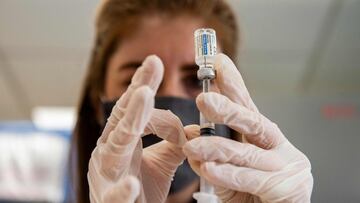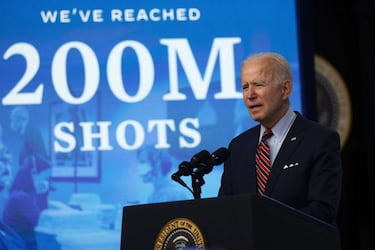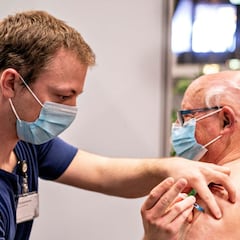Why are some Republicans against Biden's vaccination plan?
Joe Biden's covid-19 vaccination plan faces resistance from Republican voters, which may cause the US president to seek the help of Donald Trump.

The global war against the coronavirus pandemic is far from over despite mass vaccination programs being rolled out worldwide, as evidenced by a huge spike in cases in India where the single largest daily number of infections to date – almost 315,000 in a 24-hour period - was reported earlier this week. In the United States, the national vaccination program has been largely successful with President Joe Biden making good on his promise to oversee the delivery of 200 million vaccine doses in his first 100 days after assuming office. However, the US faces a very different front in the battle to contain the virus within its own borders with large numbers of Americans stating they have no intention of getting a vaccine. And in this struggle Biden is looking to an unlikely ally to give his administration’s vaccine rollout another shot in the arm: Donald Trump.
According to a Monmouth University poll published on 14 April, 43 percent of Republican voters said they would not be lining up to receive a vaccine. Across the political spectrum of Republicans, Democrats and Independents, 21 percent of US citizens have stated they will avoid the vaccine altogether if they are not obliged to get one. This creates a serious problem for the Biden administration, the Centers for Disease Control and the FDA: if one in five Americans refuse to be vaccinated, herd immunity may be impossible to achieve. Estimates of what percentage of a population need to be immunized to achieve herd immunity vary from 60-70 percent to 70-85 percent, but the reality is nobody is entirely sure: The World Health Organization states “herd immunity against measles requires about 95 percent of a population to be vaccinated. For polio, the threshold is about 80 percent.”
US unlikely to enforce covid vaccination

While some countries are exploring the possibility of making vaccination mandatory, any move to do likewise in the US would be met with a flurry of legal action that would likely end up in the Supreme Court. There is a precedent for state law to enforce vaccination on its populace – a 1905 Supreme Court ruling on mandatory vaccination in Massachusetts following a smallpox outbreak. But despite the will on healthcare grounds to get the entire population vaccinated, Biden is unlikely to risk the political storm enforcing such a mandate on Americans would reap. As such, the president will look toward the carrot rather than the stick and the White House has already announced tax credits to businesses that provide paid time off for some people to get covid-19 shots as Biden seeks to get corporate America more involved in the vaccination campaign.
Biden administration officials said the government plans to reimburse businesses for the cost of giving workers as many as 80 hours paid time off to get their shots or recover from any vaccination side effects.
The tax credit of up to $511 per day through September for each worker would be given to businesses with fewer than 500 employees, officials said. Businesses of that size employ roughly half of the country's private sector workers. The tax credits were authorized under Democratic-backed covid-19 pandemic relief legislation passed by Congress and signed by Biden.
The president also plans to make a televised appeal for all businesses to help convince people to get their shots, officials said.
J&J vaccine halt dents confidence
BREAKING: The FDA and CDC said vaccinations using Johnson & Johnson's shot can resume immediately. https://t.co/9RvXhdiPvJ
— Bloomberg (@business) April 23, 2021
However, the halting of the J&J vaccine rollout following several reported cases of blood clotting has only added to vaccine hesitancy in the US. The United States has expanded vaccination eligibility to most American adults, and more than half that population has had at least one vaccine dose, according to the CDC. A third of US adults are fully vaccinated, as well as 26% of the population overall, it said.
The FDA on Friday recommended the J&J vaccine be put back into circulation in the US but the damage done to confidence in vaccines overall may be harder to restore. This is where Donald Trump comes in.
Trump could hold key to vaccine hesitancy
Trump spoke with Fox host Sean Hannity for his first sit-down interview since leaving office.
— New Day (@NewDay) April 20, 2021
The former president “won’t stop the conspiracy theory either. This is what they discuss literally from a retirement home in Florida,” @brikeilarcnn says. #RollTheTape pic.twitter.com/P3gNbpBY86
The former president has been vaccinated but unlike other ex-White House incumbents and other public figures, he did not do so on camera. During an interview on Fox News, Trump said he “encouraged” people to get vaccinated but he has also previously stated that he appreciates people’s right to choose whether or not to receive one.
Related stories
An open Republican endorsement of the vaccine program could be vital in shifting public opinion among those reluctant to roll up their sleeves, whether it be from Trump or other prominent Republican sympathizers.
“The number of people who have been skittish about the vaccine has dropped as more Americans line up for the shot, but the hardcore group who want to avoid it at all costs has barely budged. The recent news about J&J vaccines is probably not going to help that situation. On the other hand, it might not make it all that much worse since much of this reluctance is really ingrained in partisan identity,” said Patrick Murray, director of the independent Monmouth University Polling Institute, which carried out the survey before the halting of the J&J rollout earlier in April.
- Joseph Biden
- Anthony Fauci
- Covid-19 economic crisis
- Donald Trump
- Science
- Coronavirus Covid-19
- Economic crisis
- United States
- Vaccines
- Pandemic
- Coronavirus
- Recession
- Economic climate
- Virology
- Outbreak
- Infectious diseases
- North America
- Vaccination
- Microbiology
- Diseases
- Preventive medicine
- Medicine
- America
- Economy
- Biology
- Life sciences

